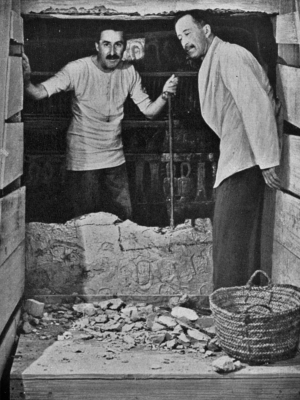
Tomb walls in ancient Egypt were inscribed with spells to frighten away grave robbers. “To all who enter to make evil against this tomb,” read one inscription, “may the crocodile be against them on water and the snakes and scorpions be against them on land.” Indeed, tragedy tracked the discovery of King Tut’s grave by archaeologist Howard Carter in 1922. When the sponsor of the Tut expedition, Lord Carnarvon, died less than a year after the tomb was opened, reporters pounced on the idea that he’d fallen victim to a mummy’s curse. It wasn’t crocs or scorpions that did in Lord Carnarvon, however. He died from an infected mosquito bite. Despite the threat of curses (along with confusing dead-end corridors and decoy treasure rooms), most royal tombs were raided and robbed in ancient times – sometimes by the very workers who built them and knew their layouts.
Picture Credit : Google
